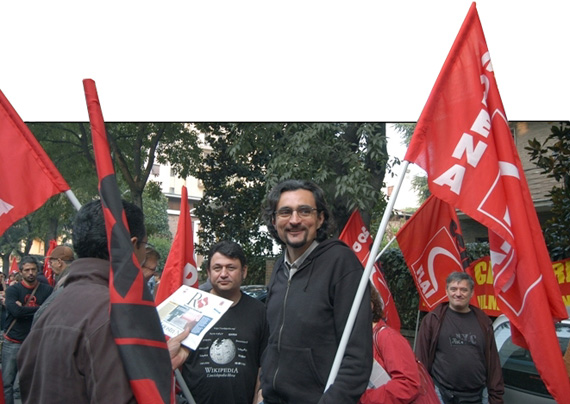|
The labor
conflict that began nine months ago in the Inalca-JBS (Gruppo Cremonini) plant
in Castelvetro, Italy, has now reached the Modena Labor Court. Upon receiving a
highly unfavorable proposal from the company to renew the collective bargaining
agreement that expired two years ago, FLAI/CGIL and FAI/CISL refused to sign it
and, instead, filed a suit against Inalca/JBS for its antiunion practices and
for violation of the national collective bargaining agreement applied to Italy’s
agro-food industry.
To learn how things got this far,
Sirel spoke with Umberto Franciosi, provincial secretary of
the Federation of Agro-Industrial Workers and General Confederation of Italian
Labor (FLAI/CGIL) in Modena, Italy.
-In April 2010
negotiations with Inalca-JBS were resumed. What
happened then?
-As you may recall, the collective bargaining agreement at the Inalca-JBS
plant in Castelvetro de Modena had expired in December 2008. The company
presented a measly proposal, which led to the suspension of negotiations, and
talks were later resumed after a number of strong union actions.
In May of this year, UILA/UIL (Italian Union of Food and Agricultural
Workers / Italian Workers’ Union) decided to accept a new proposal from the
company, which we at FLAI/CGIL and FAI/CISL (Federation of
Agriculture, Food and Environmental Industry Workers / Italian Confederation of
Workers' Unions) considered economically unacceptable and in violation of the
collective bargaining agreement established nationwide for our sector.
-What exactly
did you find unacceptable in the proposal?
-The national collective bargaining agreement establishes that all plant-level
agreements that expire before November 30, 2010 must be renewed with amounts
that cannot be any lower than those established for the previous agreement.
In this case, the
agreement we refused to sign included sums that are lower than those in the
previous agreement, which expired in December 2008.
In some areas, such as hamburger production, the sums were cut almost in half.
It also
provides a measly increase of 258 euros for 2010 and 2011. For a company this
size, that amount is like a handout, and on top of it all the company plans to
pay this with ‘tickets’ that can only be used to purchase gasoline.
We have always been against this form of payment, because it’s a ploy companies
use to get out of paying social security benefits, and, that way, they cut down
labor costs.
Most of the foreign workers - and the Castelvetro plant has a lot of foreign
workers - don’t own cars, so they were forced to sell these ‘tickets’ for less
than they are worth. That also gave rise to a ‘black market’ of gas tickets.
-What
happened after the signing of the new collective bargaining agreement?
-Despite its low membership among the plant’s workers, UILA-UIL called a
referendum, asking workers to give their opinion of the agreement signed. We
asked that the referendum be organized by the Unitary Labor Representation (RSU),
but they refused.
Incredibly enough, the referendum process was marked by the involvement of
Inalca-JBS directors and area foremen, who called on workers to participate,
in a clear violation of the Workers’ Bylaws.
Also unusual was the massive participation of workers who have never
participated in this kind of consultations. In the end, 62 percent of the voters
supported the agreement.
Given all of these irregularities, we at FLAI/CGIL and FAI/CISL
decided to file an action against the company.
-What are you
accusing the company of?
-The Workers’ Bylaws prohibit any participation by management in union
activities. It must remain uninvolved, and we have proof that this wasn’t the
case here.
The company discredited the image of our labor organizations by not applying the
national collective bargaining agreement, and pressured workers into voting in
favor of the new agreement in the referendum.
It’s obvious that their aim is to isolate and destroy us. Now it’s up to the
judge to decide whether this transnational corporation is guilty of antiunion
practices. For FLAI/CGIL and FAI/CISL, it clearly is.
-FLAI/CGIL
has also denounced the company for not being transparent about its financial
situation...
-Throughout more than a year of negotiations, Inalca-JBS maintained that
it was going through a very difficult moment as a result of the global economic
crisis.
However,
we discovered that for 2010 the company will have a Gross Operating Margin of
almost 100 million euros, and that its deficit dropped substantially from 2008
to 2009.
Which is why we’re asking to meet with the company, to discuss its financial
situation, the work situation, its investments, and, above all, the conflict
between Gruppo Cremonini and
JBS.
But so far we’ve had no response.
-What is the
conflict between the two companies about?
-Both companies are hurling accusations at each other. Actions are being brought
in court and there’s an arbitration procedure underway.
JBS
wants to end the joint-venture, and that really alarms us.
We hope that a sense of responsibility prevails on both sides, because what’s at
stake here is the future of 1,000 workers.

|